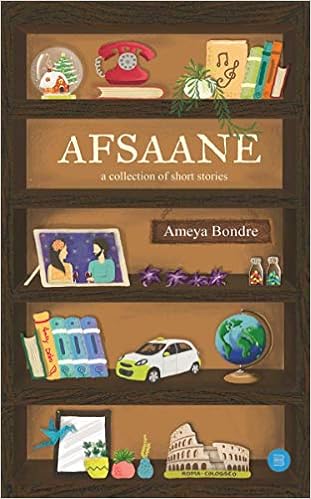1871st BLOG POST
30th Book of 2020!
All the stories have a basic premise on which author has scripted this whole book i.e. Human emotions. How, in a relationship or in difficult circumstances, each person behaves differently is what has been highlighted in the stories which shall also make you nostalgic as you shall end up remembering vulnerable incidents from your life. Author has used very simple language to tell all his stories without trying to be nazi by introducing unwanted tough vocabulary. He has only played with his characters which tells about how much time he must have taken to draft each one of them. Most of his stories are based on the life of a couple -where either they are in love, hatred, involved in relationship with no commitment, betrayal, extra-marital affairs, trial of reinvesting in the relationship etc.
Talking about the few stories that impressed me- “Distance”- the very first chapter is nicely written about the final day of a couple when they are heading for separation. How Ameya has used nature as a form of teacher in this story is a nice example of philosophy embedded in the storyline. “Dreams” is also written in a very unique style which sends the message of how an Indian woman has to sacrifice her dreams for family and has to await their permission for every dream she wants to fulfil post marriage.
“Blinkers On” was an eye-opener for me as I didn’t know that few couples have to face challenge from the family itself when they take decision of adopting a baby. The conversation of boy with his parents for the same tells a lot about our society even in this era. “Trapped” is a very unique narration as author uses a non-living thing as a character which speaks in first voice about how a human being gets addicted with it and is unable to stop even when life is about to change for good.
“A Healthy Home” tells us about the rural India and how a mother has no information about how to feed the baby post-birth which always keeps her worried regarding why her baby is not consuming food. Author also gives insight about the human behaviour where a mother is told about what shall be good for her baby but still she is resistant about it. “Long Lost” is a very nice closure to the book which is a very beautiful story about a couple who meets years after breaking-up in a different country altogether. The awkwardness of both the characters are very well represented.
Overall, all the stories in the book give you a good feeling. No story confuses you with its timeline or difficult narration. Yes, I would say, in few stories the beginning is little complicated but I think that is purposefully done by author for readers to concentrate to understand the scenario of the story. Few stories have potential of being in a full-fledged novel. I would give this book 4 stars out of 5. This book is not like other short story compilations where you get to read simple love stories. If you are a short story lover, go for this one.
<iframe style="width:120px;height:240px;" marginwidth="0" marginheight="0" scrolling="no" frameborder="0" src="//ws-in.amazon-adsystem.com/widgets/q?ServiceVersion=20070822&OneJS=1&Operation=GetAdHtml&MarketPlace=IN&source=ss&ref=as_ss_li_til&ad_type=product_link&tracking_id=a07e2-21&language=en_IN&marketplace=amazon®ion=IN&placement=B083715QK3&asins=B083715QK3&linkId=3f614f2e320ac72e8196424414b74a13&show_border=true&link_opens_in_new_window=true"></iframe>
Thanks.
WRITING BUDDHA





